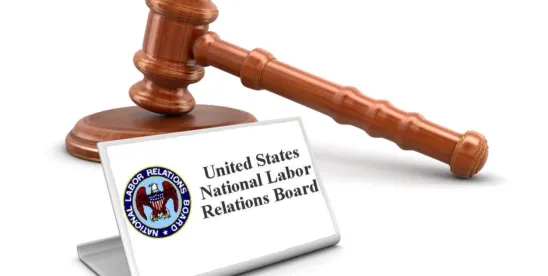On June 13, 2024, the Supreme Court of the United States held that courts must assess requests for an injunction by the National Labor Relations Board (NLRB) using the traditional four-factor test for preliminary injunctions. The ruling weakens the Board’s ability to obtain quick court orders to maintain the “status quo” in favor of workers in pending labor cases.
Quick Hits
- The Supreme Court held that federal courts must apply the traditional four-factor equitable test for preliminary injunctions when considering the NLRB’s request for a 10(j) injunction.
- The ruling found the NRLA does not require courts to defer to the NLRB’s initial findings of a labor violation.
- The ruling weakens the NLRB’s ability to quickly stop employer actions it alleges are unfair labor practices.
The Supreme Court held that when considering temporary injunction requests under Section 10(j) of the National Labor Relations Act (NLRA), courts must apply the traditional equitable four factors as set forth in the high court’s 2008 decision in Winter v. Natural Resources Defense Council, Inc. The decision means that courts must consider 10(j) injunction requests under the same equitable principles that they do for other preliminary injunctions without deferring to the NLRB’s determination that an unfair labor practice had occurred.
The unanimous decision comes in a labor dispute in which the trial court issued a preliminary injunction against an employer after applying a two-part test that only asked whether “there is reasonable cause to believe that unfair labor practices have occurred” and whether an injunction is “just and proper.” The injunction was later affirmed by the Sixth Circuit Court of Appeals.
The NLRA prohibits employers from engaging in certain unfair labor practices and allows workers to file a charge with the NLRB. The NLRA provides the NLRB with authority to seek a temporary injunction in federal court and Section 10(j) states that courts may “grant the Board such temporary relief … as it deems just and proper.”
However, the Supreme Court held that the NRLA does not strip courts of their equitable powers, and they must apply the traditional four-factor rule as articulated in Winter when considering a request for a 10(j) injunction. Under that rule, a plaintiff must show “he is likely to succeed on the merits, that he is likely to suffer irreparable harm in the absence of preliminary relief, that the balance of equities tips in his favor, and that an injunction is in the public interest.”
The Supreme Court rejected the NLRB’s argument that Section 10(j) informs the application of equitable principles and that courts should use a “reasonable cause” standard as applied by the Sixth Circuit in the case. The NLRB had pointed to the context that Congress has given it the authority to adjudicate unfair labor practice charges in the first instance and that courts must give deference to the NLRB’s final decisions.
Justice Clarence Thomas, in the Court’s opinion, stated that the reasonable cause standard “substantively lowers the bar for securing a preliminary injunction by requiring courts to yield to the Board’s preliminary view of the facts, law, and equities.” Justice Thomas stated the fact that the NLRB is the body that will adjudicate unfair labor practice charges on the merits does not mean courts must defer to what amounts to be the NLRB’s initial litigating position. Section 10(j) “does not compel this watered-down approach to equity,” Justice Thomas stated.
In a partial dissent, Justice Ketanji Brown Jackson agreed that the NRLA does not strip courts of their equitable powers and that the injunction in the case should be overturned. However, Justice Jackson argued the Court should not ignore the fact that Congress, through the NRLA, granted the NLRB authority over labor disputes.
Key Takeaways
The Supreme Court’s ruling raises the bar for the NLRB to seek injunctions by requiring courts to make their own assessment of the equitable factors for issuing preliminary injunctions without deference to the NLRB’s initial findings that an unfair labor practice has occurred. Under the reasonable cause standard, the NLRB merely had to show that its legal theory was not frivolous and that an injunction was necessary to protect the “status quo” pending the NLRB’s proceedings. That standard had allowed the NLRB to quickly put a stop to employer actions that its in-house attorneys believe are labor violations during the pendency of an administrative proceeding on the merits, which could take years to resolve.




 />i
/>i

